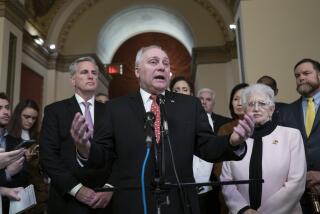Obama renews debate on energy bill
Reporting from Washington — President Obama may not yet have persuaded Congress to approve a sweeping new energy bill, but as Senate Democrats meet behind closed doors Thursday to hammer out a list of proposals, he has clearly rekindled the debate.
In a sign of the president’s engagement on a goal that was all but given up for dead before oil started gushing in the gulf, Obama has summoned eight senators to the White House next week for broad, bipartisan talks about the legislative path forward.
Obama, after his morning meeting with BP executives at the White House, also sat down Wednesday with Sen. Scott Brown (R-Mass.), who has been a swing vote on several issues this year.
Much like the development of the massive healthcare bill, moving major energy legislation is likely to be a difficult and contentious process.
But with midterm elections looming, some advocates and congressional Democrats say Obama must become engaged quickly and set clear priorities.
“He needs to make it clear that this has to be a bold and comprehensive plan,” said Sen. Mark Begich (D- Alaska), who might support a far-reaching bill that would set a price on carbon emissions — essentially a tax on industries that emit greenhouse gases that are deemed responsible for global warming.
Obama’s role during the healthcare debate frustrated lawmakers because he hesitated to spell out his preference on make-or-break provisions.
Even with an all-out administrative effort, congressional action on comprehensive energy legislation remains tough politically.
Obama spoke only in general terms this week during his prime-time speech on the gulf spill, calling on Congress to “embark on a national mission” to develop cleaner energy sources that can reduce the nation’s dependence on oil.
“The tragedy unfolding on our coast is the most painful and powerful reminder yet that the time to embrace a clean energy future is now,” Obama said.
Obama pointed to House passage last year of a sweeping energy bill that includes a so-called cap-and-trade system, also known as carbon pricing, which sets a limit on the amount of greenhouse gases that can be emitted by utilities and other industries, and essentially taxes entities that exceed those limits.
A similar Senate measure is unlikely to win the 60 votes needed for passage, and some senators prefer to focus on energy efficiency provisions and renewable energy sources, such as wind and solar. Others suggest a slimmed back carbon pricing system, on only the utility industry.
Democrats face regional differences over energy policy, as well as Republican opposition.
Republican leaders in the House and Senate have repeatedly criticized the president for capitalizing on the devastation in the gulf to advance his agenda for cap-and-trade legislation, which they often deride as “cap-and-tax.”
Brown has said he would be unwilling to support such a system during the economic downturn.
Sen. Susan Collins of Maine, who is among several Republican senators invited to the bipartisan meeting at the White House next week, said Obama was trying to put clean energy on the agenda, but “whether he follows through beyond the speech remains to be seen.”
Showing the difficulty Obama faces in winning support from even his own party for major energy reform, Sen. Ben Nelson of Nebraska is among several Democratic lawmakers who said they did not see the connection between the spill in the gulf and the need for a carbon pricing system.
“I don’t know that it has much to do with the spill — other than the spill is from oil,” Nelson said.
Jim Tankersley from the Washington bureau contributed to this report.
More to Read
Sign up for Essential California
The most important California stories and recommendations in your inbox every morning.
You may occasionally receive promotional content from the Los Angeles Times.











